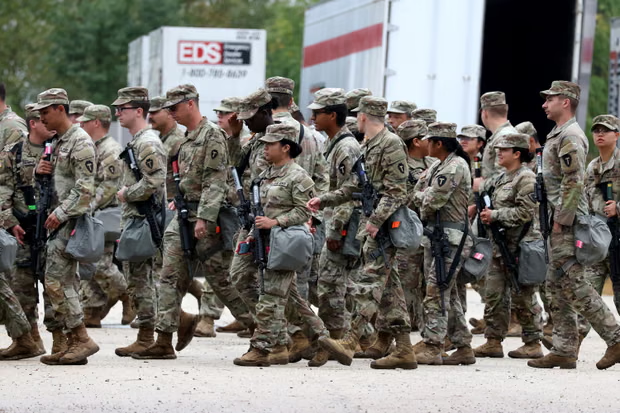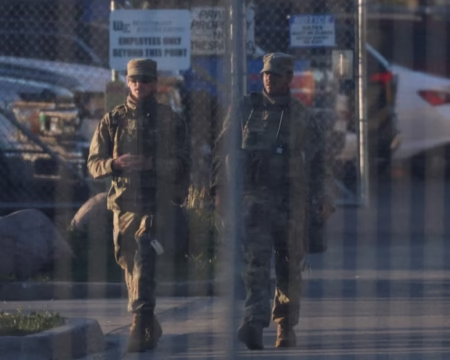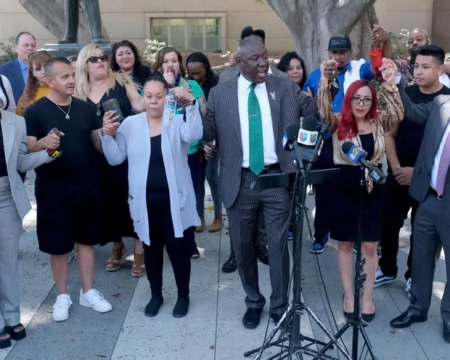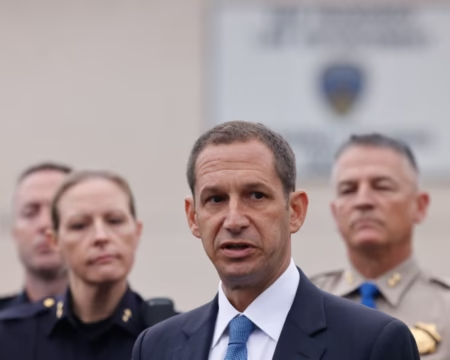Texas National Guard troops have arrived in Chicago, marking a new stage in Donald Trump’s immigration crackdown. The deployment follows weeks of rising tension, protests, and legal battles between the White House and Illinois state officials.
Federal immigration enforcement has intensified in recent weeks, especially in the Chicago suburb of Broadview, where clashes between police and protesters turned violent. Videos show tear gas and pepper spray used against crowds demanding an end to Trump’s immigration raids.
The deployment began shortly after a U.S. district judge, April Perry, declined to stop the troops from entering the city. The state of Illinois and the city of Chicago had filed a lawsuit earlier this week, arguing that the federal government has no right to send troops without state consent.
Illinois Attorney General Kwame Raoul filed the case on Monday to prevent the president from using the state’s own National Guard or bringing in troops from other states such as Texas. He called the move unconstitutional and an abuse of executive power.
However, after the judge’s decision, the Texas National Guard mobilized quickly. Reports confirmed that troops were stationed around Chicago by Tuesday, raising concerns among local residents and leaders.
Chicago Mayor Brandon Johnson responded by signing an executive order banning Immigration and Customs Enforcement (ICE) agents from operating on any city-owned property. It was his third order in recent weeks to limit federal agents’ access. Johnson said the city must defend its rights against what he called “unchecked federal interference.”
He explained that city property and unwilling businesses will not be used for federal immigration raids. Johnson said Chicago must protect its people and laws, especially when Congress fails to act.
The White House, however, criticized Johnson’s move. Officials accused him of protecting criminals and obstructing federal law enforcement. Trump’s team insisted the troops were needed to strengthen immigration control and restore order.
Illinois Governor J.B. Pritzker also condemned the military intervention. He said troops have no place in American cities unless there is a real emergency or insurrection. Pritzker vowed to resist any attempt to use the military to restrict civil rights.
Mayor Johnson has been outspoken since Trump first announced the plan. During a Labor Day rally, he told supporters that Chicago would defend democracy and protect every resident, regardless of their background or immigration status.
Illinois Senator Dick Durbin also issued a strong statement, calling the deployment both unlawful and unnecessary. He said National Guard personnel should never be used as political tools in partisan conflicts.
The conflict between Trump and Democratic-led states has been growing. Chicago joins a list of cities targeted by the administration for federal crackdowns. Trump has also sent or attempted to send troops to Portland, Los Angeles, and Washington D.C., sparking similar backlash from state officials.
In Portland, a federal judge blocked Trump’s latest deployment attempt just days ago, after Oregon Governor Tina Kotek warned that such moves threaten democracy and state independence.
Earlier this year, National Guard troops were also sent to Los Angeles, where ICE agents conducted large-scale raids, and to Washington D.C., as part of what Trump described as a “law and order” mission.
Trump has said these actions are necessary to control illegal immigration and reduce violent crime. Yet, data from local law enforcement agencies show that crime rates in many of these cities, including Chicago, have been steadily falling.
The situation in Chicago continues to evolve, with legal challenges and political tension mounting. Illinois officials have promised to keep fighting the federal intervention, while city leaders prepare for potential confrontations between protesters and military forces.
As of Tuesday, the Texas National Guard remains stationed across several locations in the Chicago area, signaling that the political and legal battle over Trump’s crackdown is far from over.







